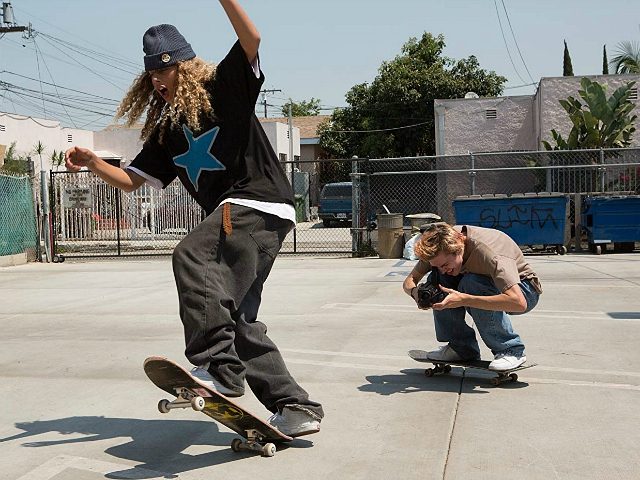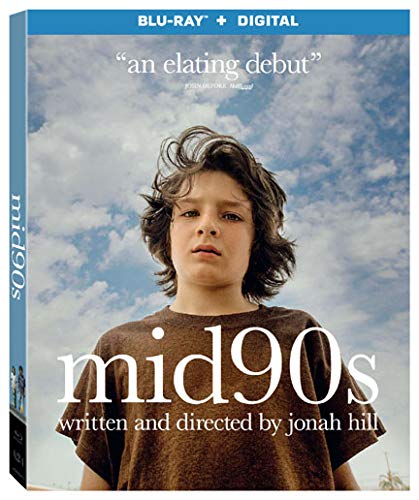Almost every day I’m given the opportunity to request a screener of this or that movie, but by the end of the year, I might request only a half-dozen or so. Movies aren’t very good anymore and life’s too short. My request for a Mid90s screener, Jonah Hill’s fantastic directorial debut (he’s also the sole screenwriter), was based on one thing: a particular grievance of mine.
For some reason, it drives me crazy that American culture has been stuck in the rut of sameness for a quarter century now. The 20s, 30s, 40s, 50s, 60s, 70s, and 80s, are distinct decades, are something all their own. Sometime around 1995, though, our culture froze. I’m currently watching The Sopranos (1999-2007) and other than the technology, not a thing seems out of place.
How did we allow this to happen?
Think about this…
In 1998, Adam Sandler was able to transport us to another era, the ’80s, with The Wedding Singer. Remember how watching that less than ten years after the end of the actual ’80s gave you a sense of nostalgia?
For this cultural outrage (and for everything else wrong in the world) I blame the godless Boomers, who are terrified of death, who run everything, and who have abused that power to freeze our culture in the amber of Good Will Hunting. Do you have a better explanation for why Ben Affleck and Matt Damon are still “stars?” The goddamned Baby Boomers don’t want to die, and in their eternal arrogance believe that if the Rolling Stones keep touring they can–
Where was I?
The Wedding Singer had only ten years to work its time-traveling magic. Mid90s has 25 years. For my theory to be disproved, Mid90s would have to look and feel as though it were shot in a totally different era…
It doesn’t.
For example, although the names of the artists have changed, the music from Mid90s sounds just like today’s music. Twenty-five freakin’ years later we’re still listening to rap, Los Angeles is still a one-story ghetto, and nothing about the fashions or hairstyles or anything else would look out of place if Hill had set his movie in 2019 — except one crucially important thing…
Freedom.
Hill’s vivid characters enjoy a spirit of youthful rebellion and freedom that has been exterminated in this, the era of Woke. Hill transports us to a magical time before the establishment abused the public schools and social media as a terror-tool of speech and thought oppression.
Hill’s wonderful gang of kids actually talk and act like kids — call each other “gay,” “faggots,” “retards,” and “nigga.” If that doesn’t shock the Woke Squares enough, they also smoke — gasp! — cigarettes. But, and this is important — none of it means anything. These words are just words, guileless, a form of expression. In the same way Italians use “fuhgeddaboutit,” this handful of words is shorthand for a million other words.
Hill presents his characters as they are, and not as they are “supposed to be” via the ideological, virtue-signaling filter that has turned so much of modern-day “entertainment” into feeling like homework or a trip to a re-education camp.
Don’t misunderstand me; neither Hill nor I are pining away for an America where everyone runs around hurling slurs. That is not his point, and there was never a time like that because as decent people mature they drop that kind of language.
My point is this: take a look around. We now live in a society where a Heisman Trophy winner’s future is threatened by media gangsters over a seven-year-old tweet that contains the word “queer.” The Woke examine our social media accounts in the same way the Nazis examined your “papers,” and all Hill is saying is that things were better when young people were still allowed to be young.
And there is no apology from Hill for the way his characters express themselves. No ham-handed moral awakening about how it’s wrong for a white kid to smoke a Kool 100 and call his black pal “nigga.” And if one of Hill’s characters did have such an epiphany, the others would call him a “faggot.”
Hill’s movie is honest and real and funny and lovely — a beautifully acted, shot, directed, written, and scored coming of age classic filled with grace moments and life lessons.
Our hero is 13-year-old Stevie (a marvelous Sunny Suljic) who’s arrived at that age where it’s time to put away the Ninja Turtles. Raised by Dabney, a single mother, Stevie’s only male role model is his older brother Ian, an abusive bully.
Desperate to grow up, Stevie thinks he’s found what he’s looking for in a group of older boys who spend their days skateboarding and talking shit.
Most of all, these kids are cool, and above all, Stevie wants to be cool.
Stevie edges his way into the group through Ruben, the youngest and closest to Stevie’s age. But it costs him — $40 to be exact, and the chunk of innocence lost when you steal from your own mother.
Before long, the troubled Fuckshit (Olan Prenat), the awkward Fourth Grade (Ryder McLaughlin), and the group’s unelected leader, Ray (Na-kel Smith), lead Stevie through the joys of illegal skateboarding, house parties, illicit cigarettes, beer, weed, and the touch of a woman.
Most importantly, he learns the only life lesson that matters — which is how to handle himself, carry himself, and stand up for himself in a big bad world that chews up and spits out crybabies.
Hill does two things that are perfect. The first is that he shows instead of tells. His characters are not defined by what they say, by exposition, but by what they do. And then there is the morality of it all…
Again, without preaching, but through story and character, there are consequences for bad behavior. Fuckshit is already doomed by his addictions and it is Dabney’s own sordid past with too many men that sends her son Stevie off into his own spiral.
Thankfully there is Ray, the moral center of it all, the one who understands the difference between fun and self-destruction, and who knows how to pass along that wisdom along without being a dick.
At just 85 minutes, Mid90s was over way too soon. I wanted to hang out with these kids forever, wanted to find out what happened to them. Thankfully, Hill chose to leave them as they are, to leave them to just be. And, despite the cracks that have already begun to show, to leave them still clinging to one another at that age just before life forces you to drift away forever from friends you will never forget.
Movies like Animal House and Caddyshack taught my generation to be young. Clueless and Dazed and Confused were there for 90’s teens. This Woke Generation appears to be hopeless — a bunch of censorious, pious, joyless, angry, humorless, tattletale prigs desperate to see themselves as victims.
If you’re a parent to one of these monsters, for all our sake, try to deprogram them with Mid90s.
The Mid90s is available on Bluray and DVD.
Follow John Nolte on Twitter @NolteNC. Follow his Facebook Page here.


COMMENTS
Please let us know if you're having issues with commenting.